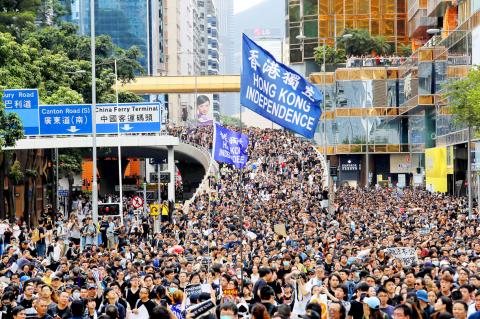Tens of thousands of anti-government protesters yesterday rallied outside a train station linking Hong Kong to China, the latest mass show of anger as advocates try to keep pressure on the territory’s pro-Beijing leaders.
The rally was the first major large-scale protest since Monday last week’s unprecedented storming of the Hong Kong Legislative Council by largely young, masked protesters — which plunged the territrory further into crisis.
Hong Kong has been rocked by a month of huge marches as well as a series of separate violent confrontations with police, sparked by a bill that would allow extraditions to China.

Photo: AP
The bill has since been postponed in response to the intense backlash, but that has done little to quell public anger, which has evolved into a wider movement calling for democratic reforms and a halt to sliding freedoms in the semi-autonomous territory.
Organizers said about 230,000 people snaked their way through streets in the harbor-front district of Tsim Sha Tsui, an area popular with Chinese tourists.
Police said 56,000 turned out at the protest’s peak.
The march was billed as an opportunity to explain to Chinese in the territory what their protest movement is about.
Inside China, where news and information are heavily censored, the Hong Kong protests have been portrayed as a primarily violent, foreign-funded plot to destabilize the motherland, not a mass popular movement over Beijing’s increased shadow over the semi-autonomous territory.
“We want to show tourists, including mainland China tourists, what is happening in Hong Kong and we hope they can take this concept back to China,” Eddison Ng, an 18-year-old demonstrator, told reporters.
Hong Kongers speak Cantonese, but protesters were using Bluetooth to send leaflets in Mandarin — the predominant language in China — to nearby smartphones, hoping to spread the word by digital word of mouth.
“Why are there still so many people coming out to protest now?” one man said in Mandarin through a loudspeaker. “Because the Hong Kong government didn’t listen to our demands.”
Many protest banners were written with the simplified Chinese characters used in China, not the traditional characters used in Taiwan and Hong Kong.
A Hong Kong lawmaker coached crowds how to chant “Students are not rioters” using standard Mandarin pronunciation.
Protesters were demanding that the postponed extradition bill be scrapped entirely, an independent inquiry into police use of tear gas and rubber bullets, amnesty for those arrested, and for the unelected Hong Kong Chief Executive Carrie Lam (林鄭月娥) to step down.
In an interview with the BBC yesterday, Chinese Ambassador to the UK Liu Xiaoming (劉曉明) said the extradition bill was needed to “plug loopholes” and that Beijing has “full confidence in the Hong Kong government.”
The protest began on the waterfront — the first time a rally has taken place off Hong Kong’s main island — and made its way to West Kowloon, a multibillion-dollar station that links to China’s high-speed rail network.
Police placed the glass-and-steel structure in virtual lockdown. Long lines of water-filled security barriers surrounded the station, while only those with previously purchased tickets were being allowed in.

NATIONAL SECURITY THREAT: An official said that Guan Guan’s comments had gone beyond the threshold of free speech, as she advocated for the destruction of the ROC China-born media influencer Guan Guan’s (關關) residency permit has been revoked for repeatedly posting pro-China content that threatens national security, the National Immigration Agency said yesterday. Guan Guan has said many controversial things in her videos posted to Douyin (抖音), including “the red flag will soon be painted all over Taiwan” and “Taiwan is an inseparable part of China,” while expressing hope for expedited “reunification.” The agency received multiple reports alleging that Guan Guan had advocated for armed reunification last year. After investigating, the agency last month issued a notice requiring her to appear and account for her actions. Guan Guan appeared as required,

Japan and the Philippines yesterday signed a defense pact that would allow the tax-free provision of ammunition, fuel, food and other necessities when their forces stage joint training to boost deterrence against China’s growing aggression in the region and to bolster their preparation for natural disasters. Japan has faced increasing political, trade and security tensions with China, which was angered by Japanese Prime Minister Sanae Takaichi’s remark that a Chinese attack on Taiwan would be a survival-threatening situation for Japan, triggering a military response. Japan and the Philippines have also had separate territorial conflicts with Beijing in the East and South China

A strong cold air mass is expected to arrive tonight, bringing a change in weather and a drop in temperature, the Central Weather Administration (CWA) said. The coldest time would be early on Thursday morning, with temperatures in some areas dipping as low as 8°C, it said. Daytime highs yesterday were 22°C to 24°C in northern and eastern Taiwan, and about 25°C to 28°C in the central and southern regions, it said. However, nighttime lows would dip to about 15°C to 16°C in central and northern Taiwan as well as the northeast, and 17°C to 19°C elsewhere, it said. Tropical Storm Nokaen, currently

PAPERS, PLEASE: The gang exploited the high value of the passports, selling them at inflated prices to Chinese buyers, who would treat them as ‘invisibility cloaks’ The Yilan District Court has handed four members of a syndicate prison terms ranging from one year and two months to two years and two months for their involvement in a scheme to purchase Taiwanese passports and resell them abroad at a massive markup. A Chinese human smuggling syndicate purchased Taiwanese passports through local criminal networks, exploiting the passports’ visa-free travel privileges to turn a profit of more than 20 times the original price, the court said. Such criminal organizations enable people to impersonate Taiwanese when entering and exiting Taiwan and other countries, undermining social order and the credibility of the nation’s